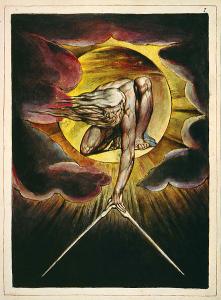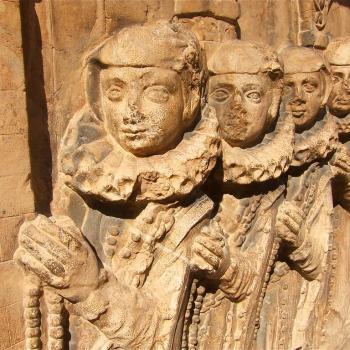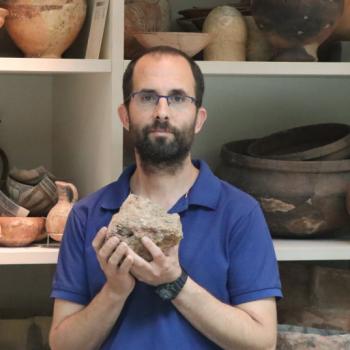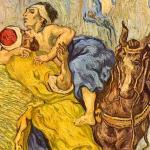In my book, The Word Set in Stone: How Archaeology, Science and History Back Up the Bible (Catholic Answers Press, 2023), I suggest quite a few possible scenarios whereby biblical events usually assumed to be miraculous may have a plausible natural explanation. I repeatedly explain my precise position in my book, especially (and in the most sustained detail) in the Introduction. For anyone who has an e-book version, the relevant words can be searched. “Miraculous” appears fifteen times, “miracle” 21 times (not counting its appearance in one of the chapter titles), and “supernatural” 18 times.
My (excellent) editor, Drew Belsky, passed on to me some concerns that have been expressed, and asked me if I could clarify my position. I’m more than happy to do so. He wrote: “I know of people who say approaches like yours diminish the majesty of God because they reduce every alleged miracle to mere natural phenomena, meaning the atheist is even less convinced of the supernatural.” Well, this is what is called a “straw man” in logic. That is, the question presupposes that I hold a position that I don’t in fact hold. I actually fully agree with the concern expressed by these people, and stated as much in my book, in the last two paragraphs of my Introduction (p. 15):
A theologically liberal or skeptical mentality does exist, whereby every miracle in the Bible is “explained away” by natural processes because of disbelief in all miracles from the outset. I detest that, and it’s not at all my own position.
Rather, mine is a view that fully accepts the possibility and factuality of actual divine, supernatural miracles, while at the same time recognizing that God’s omniscience and omnipotence, providence and sovereignty are such that he can and does also incorporate natural events into his divine plans for the human race and the accomplishment of his will.
The claim was that “approaches” like mine “reduce every alleged miracle to mere natural phenomena.” But as I explained in the book already, I “detest” such a position, which flows from disbelief in all miracles. That’s why there is an urge in such people to dismiss every miracle in the Bible or in Christianity, because they have ruled out the possibility of them from the outset, as philosopher David Hume famously – or infamously – and irrationally did. In other words, my position may be summed up as:
God can and does accomplish his purposes and incorporate into his providence both miraculous acts and natural events. I gave several examples of the latter in my book: God using the Assyrians and Babylonian king Nebuchadnezzar to judge his own people when they strayed, and Persian King Cyrus to aid them, and using a meteor to judge Sodom and Gomorrah (see p. 14). And I gave several examples of things that could only be totally or partially supernatural, such as four of the ten plagues upon Egypt, and Christian beliefs such as the raising of the dead, walking on water and through walls, Balaam’s talking donkey, the Incarnation, the Virgin Birth, the atonement, and Jesus’ resurrection and ascension (see pp. 13-14). Moreover, I stated: “I throw out interesting possibilities or theories, not necessarily taking a position. I never claim that things must have been the way I suggest” (p. 14).
The skeptical / agnostic / atheist position regarding miracles, on the other hand, can be accurately summarized as follows:
If indeed there is a God, he doesn’t perform miracles, because they are impossible, and if there is no God, the impossibility is all the more certain, because everything reduces to natural laws that govern the behavior of matter: God not being present to contravene or “overrule” any of these laws.
These two positions are as different as night and day or east and west. Anyone who attributes anything remotely like the second position to me either hasn’t read my book, or if he or she has done so, has vastly misunderstood what I made crystal clear over and over. My position is not at all “anti-supernatural.” Rather, it is against a position that appears to think that everything God does is supernatural or that every act he performs to aid human beings is supernatural.
One person who responded to an article of mine at National Catholic Register that consisted of excerpts from my book, was far more blunt, as well as slanderous:
What is most disturbing is that the author seems completely devoid of supernatural faith. The view he presents is that of liberal Protestantism. It completely denies the miraculous and infers God is deceptive, factually ignorant, or a writer of myths. It’s offensive to see this in a supposedly Catholic publication.
This article (especially the Addendum) disposes of this nonsense ten times over. As for an atheist being less convinced of the supernatural because of a possible (not necessary or undeniable!) natural explanation of some acts that are largely assumed to be miraculous, I’m not convinced this is the case, or that it is more often than not. Again, I deny the assumed premise in the criticism. St. Paul said, “I have become all things to all men, that I might by all means save some” (1 Cor 9:22, RSV). Now, I am not seeking to think like an atheist in order to convince the atheist of Christianity. That would be both self-contradictory and absurd. What I’m doing is attempting to persuade them in areas where there might be common ground to be had.
The atheist (we must remember) denies all miracles by definition, because there is no God to perform them, and they are senseless from the perspective of natural scientific laws. Therefore, I merely throw out possibilities of natural explanations of some things in the Bible. This may have the effect of causing the atheist to consider the Bible more seriously than before, because he or she can comprehend things in a way that is not immediately contrary to their presuppositions. But in doing so I remain uncommitted to the notion that these things “must” be natural. I say they might possibly be, and by the same token, that they may be miraculous.
The second (falsely) alleged “problem” in my thinking was passed along to me by Drew Belsky as follows: “Christians will say that every miracle must be naturally plausible, or else it shouldn’t be believed.” Again, this is not my position, which makes clear that many beliefs in Christianity are clearly miraculous or supernatural, and could hardly be otherwise. How could something like the Incarnation of Jesus or his being conceived by the Holy Spirit, or our being saved as a result of his sacrifice on the cross not be miraculous? The concern as expressed or its supposed description of my view is viciously self-contradictory, because miracles (such as the three examples I just mentioned) are by definition other than natural (!). That’s why we have the term “supernatural”: meaning “beyond the natural.”
The concern is even phrased wrongly. I never stated (nor ever thought) that any given miracle must have a possible natural explanation in order to be believed. Rather, I am contending that some biblical events assumed by many to be miraculous may have been in fact, natural events: the timing of which was coordinated by God in his foreknowledge and providence. I think the strongest cases for this that I made are the Hebrews being fed by quail in the wilderness, and Moses drawing water from rock. It’s very plausible that both things were natural, as I argued in the book, from scientific findings. But why should that be thought of as an “anti-miraculous” mentality on my part? To suggest that one particular thing was perhaps not miraculous is not to extend that speculation to all things.
ADDENDUM:
Fifty Things That I Believe Can Only be Regarded as Miraculous / Supernatural in the Old Testament
Lest someone make the unfounded charge that I supposedly deny all miraculous events in the Old Testament (something I have never stated nor believed in the 46 years that I have been seriously seeking to follow Jesus Christ as his disciple, and over the 42 years I have written about apologetics), here is a list of things in the Old Testament that I consider miraculous, and would never attempt to offer even a possible natural explanation:
- God’s creation of Adam and Eve (i.e., male and female human beings with souls, made in his image: Gen. 1:27).
- The devil as a real spiritual being.
- Demons as real spiritual beings.
- Angels as real spiritual beings.
- God’s creation of the universe (at least in the initial stages; e.g., one may hold that he initiated the Big Bang, and then it was all natural processes: Gen. 1:1).
- God’s creation of the earth (at least in the initial stages): Gen. 1:1.
- God’s omnipotence (Job 42:2; Jer. 32:17).
- God’s omniscience (1 Chron. 28:9; Ps. 147:5).
- God’s omnipresence (Ps. 139:7-8; Jer. 23:24).
- God’s eternal existence (Gen. 21:33; Exod. 3:14).
- The Holy Trinity.
- God’s immutability (inability to change): Mal. 3:6.
- Original sin / the fall of man as a cosmic catastrophe, requiring supernatural grace to overcome (Gen. 3:22-24).
- God’s prediction of the Flood (Gen. 7:4).
- God’s Covenant with Noah (Gen. 9:8-17).
- God’s Covenant[s] with Abraham (Gen. 15:18-21; 17:1-14).
- God’s Covenant with Isaac (Gen. 17:19-21; 26:24).
- Theophanies in which God appeared as a man or an angel in the OT (e.g., Gen. 18:1-2).
- Sarah giving birth to Isaac at age 90 (Gen. 17:17).
- God calling to Hagar from heaven (Gen. 21:17).
- Whenever God communicates to human beings in any fashion (e.g., Gen. 22:1-2).
- Whenever angels communicate to human beings in any fashion (e.g., Gen. 22:15).
- Heaven.
- Sheol or Hades.
- Balaam’s talking donkey (Num. 22:28).
- Joshua’s long day (Josh. 10:12-15).
- The burning bush on Mt. Sinai (Exod. 3:2-6).
- God writing and carving the Ten Commandments (Exod. 24:12; 31:18; 34:1).
- Moses’ rod becoming a serpent (Exod. 4:2-4).
- Moses’ hand becoming leprous (Exod. 4:6-7).
- The killing of the first-born Egyptian children and the first-born of the Egyptians’ cattle (Exod. 11:5, 7; 12:29).
- God’s protection of the Hebrews during the first Passover (Exod. 12:22-23).
- God making the water become sweet (Exod. 15:25).
- Jonah being raised from the dead in the belly of the whale (Jon. 2:1-7).
- God’s presence in the pillar of smoke (Exod. 13:21).
- God’s presence in the pillar of fire (Exod. 13:21).
- God’s special presence between the wings of the cherubim on top of the ark of the covenant (Exod. 25:22).
- The OT sacrificial system as a way to extend God’s forgiveness to human beings (e.g., Lev. 4:27-31).
- Elijah raising the dead (1 Kings 17:21-22).
- Elisha raising the dead (2 Kings 4:32-35).
- The prophet Samuel coming back from the dead to appear to Saul (1 Sam. 28:12-19).
- The fire on Mt. Carmel that came down from God to burn up a hundred false prophets of Baal (2 Kings 1:10-12).
- Elijah going up to heaven in a whirlwind (2 Kings 2:11).
- The three Hebrew children saved in the fiery furnace (Dan. 3:8-27).
- All prophecies made by the prophets that came true.
- Isaiah seeing God in heaven (Isa. 6:1-5).
- Daniel’s vision of God (Dan. 7:9-10).
- Daniel saved from the lions (Dan. 6:16-23).
- The angels killing of thousands of Assyrian soldiers (2 Kings 19:35).
- Moses’ prayer as part of the process of God forgiving the sinning Israelites (Num. 14:19-20).
***
Practical Matters: Perhaps some of my 4,200+ free online articles (the most comprehensive “one-stop” Catholic apologetics site) or fifty-one books have helped you (by God’s grace) to decide to become Catholic or to return to the Church, or better understand some doctrines and why we believe them.
Or you may believe my work is worthy to support for the purpose of apologetics and evangelism in general. If so, please seriously consider a much-needed financial contribution. I’m always in need of more funds: especially monthly support. “The laborer is worthy of his wages” (1 Tim 5:18, NKJV). 1 December 2021 was my 20th anniversary as a full-time Catholic apologist, and February 2022 marked the 25th anniversary of my blog.
PayPal donations are the easiest: just send to my email address: apologistdave@gmail.com. You’ll see the term “Catholic Used Book Service”, which is my old side-business. To learn about the different methods of contributing, including 100% tax deduction, etc., see my page: About Catholic Apologist Dave Armstrong / Donation Information. Thanks a million from the bottom of my heart!


















